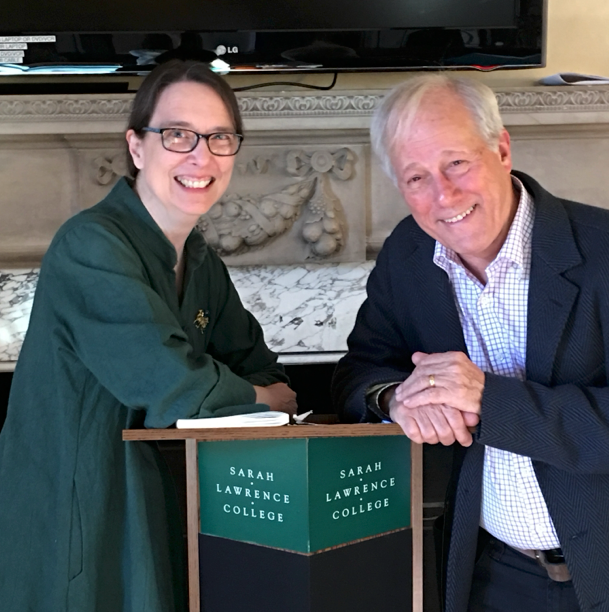What a moment it is, to find a poet whose work is unlike any other, and is so good that we pray the poetry gods will keep her safe and warm and grant her a long life of writing such poems for us. For me that moment was when I read her poems in Poetry magazine years ago.
Sarah Lindsay writes with a sensibility that is hungry to explore the extremes of human experience. Of a polar explorer: “On the southern ice cap, one turns his frozen socks inside out//and shakes his blackened toes into his lap.” Her tool of discovery is a remarkable imagination that takes her on a deep-ocean dive 3000’ feet down; to an ancient kingdom entirely of her own invention; to a burn unit on the Jovian moon Callisto. It takes her beyond the human to squids, lichens, a Thai elephant orchestra, and the life of the earth’s first cell. What the poems bring back from all these journeys would do the Royal Explorers Club proud.
By bringing to her poems a serious knowledge of archeology, history and the sciences — especially earth science and animal behavior — Sarah is colonizing fresh experience for poetry. Her poems are not only beautiful and moving, with a mischievous sense of humor. They are also important: This poetry is increasing the footprint of the art form. If any of you were in college as long ago as I was, you may recall a widely-read little book by C.P. Snow called The Two Cultures. In it he recognized and deplored the split of our intellectual life into two cultures that do not speak to each other: the sciences and the humanities. Were Lord Snow with us today to hear Sarah’s poems, he would be pleased.
Lindsay has published her poems in books with Grove Press and with Copper Canyon Press. It’s hard to call her unrecognized: A National Book Award finalist; a Lannan Literary Fellowship; the Carolyn Kizer Prize and Pushcart Prize, among others; and publication in a pantheon of literary magazines. It may be hard to call her unrecognized, but it’s easy to say we hope the poetry gods are listening.
Origin
The first cell felt no call to divide.
Fed on abundant salts and sun,
still thin, it simply spread,
rocking on water, clinging to stone,
a film of obliging strength.
Its endoplasmic reticulum
was a thing of incomparable curvaceous length;
its nucleus, Golgi apparatus, R N A
magnificent. With no incidence
of loneliness, inner conflict, or deceit,
no predator or prey,
it had little to do but thrive,
draw back from any sharp heat
or bitterness, and change its pastel
colors in a kind of song.
We are descendants of the second cell.
Sarah Lindsay

